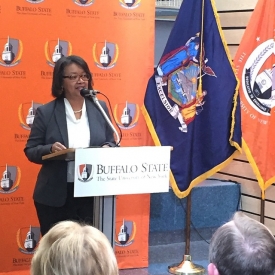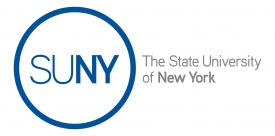
The leadership from every State University of New York (SUNY) campus in Western New York today called on local state legislators to continue their bold leadership in supporting New York's public higher education sector by creating a new Investment Fund and extending NYSUNY 2020—including the broadly successful predictable tuition policy—in the 2015–16 New York State Budget.
 On the campus of SUNY Buffalo State, five SUNY presidents, including Katherine Conway-Turner, Buffalo State; Skip Sullivan, Alfred State College; Virginia Horvath, State University of New York at Fredonia; Cory Duckworth, Jamestown Community College; and James Klyczek, Niagara County Community College; were joined by SUNY Trustee Eunice Lewin and representatives from the University at Buffalo and Erie Community College to present a unified voice advocating for all 64 of SUNY’s campuses.
On the campus of SUNY Buffalo State, five SUNY presidents, including Katherine Conway-Turner, Buffalo State; Skip Sullivan, Alfred State College; Virginia Horvath, State University of New York at Fredonia; Cory Duckworth, Jamestown Community College; and James Klyczek, Niagara County Community College; were joined by SUNY Trustee Eunice Lewin and representatives from the University at Buffalo and Erie Community College to present a unified voice advocating for all 64 of SUNY’s campuses.
“Investing in SUNY is good for the individuals receiving the education, for the communities in which they reside and for the entire state of New York,” Conway-Turner said. “In order to continue to address the cultivation of all citizens, Buffalo State, like all SUNY campuses, must be able to rely on adequate state appropriation so that we can maintain reasonable costs for our students, offer strong, effective, and relevant academic programs, address critical construction needs and provide this great state with the exceptional future leaders that it deserves.”
Fredonia President Horvath said, “Supporting SUNY is a critical investment in the future vitality of our state. The strong academic offerings at SUNY campuses continue to provide affordable public education that New York needs to be competitive and to have informed, engaged citizens. I graduated from the University at Buffalo at a time that a significant part of the operating budget was funded by the state. We need the same investment in this generation of college students, and SUNY's budget proposal outlines such an investment."
Alfred State President Sullivan added, “Distinctive characteristics of SUNY students include civic engagement, sustainability, and leadership. As a result, these students make a difference in the New York State communities they live in and in communities around the world.”
University at Buffalo President Satish Tripathi said, “Our University at Buffalo community is very grateful for the leadership of our legislative delegation in championing the historic NYSUNY 2020 legislation, which has had a truly transformative impact on our university, our students, and the communities we serve. Over the past few years, NYSUNY 2020 has enabled us to make powerful investments in our students and in our research enterprise. As just a few examples, we have implemented the Finish in 4 program to enable on-time graduation for our students; we’ve hired 277 faculty in high-demand areas; we’ve expanded experiential learning programs; and we have ensured that a world-class UB education is accessible by making a major investment in need-based financial aid. All these investments add up to an extraordinary educational experience for our students, who see the great value of NYSUNY 2020 in creating the predictability that students and families desire while helping our campuses invest further in the educational excellence they deserve.”
Since NYSUNY 2020 was first enacted, SUNY campuses have used additional revenue generated by rational tuition to grow and expand student services, including the hiring of 520 net new instructional staff, 270 of whom are full-time faculty, and the implementation of 100 new degree programs reflecting high-demand areas in New York’s workforce. Additionally, SUNY continues to be a huge economic driver for the state, serving 3 million New Yorkers every year – including students, faculty and staff, and more – and an economic powerhouse that generates $21 billion annually for New York.
 Jamestown President Duckworth said, “Jamestown Community College is a crucial asset for Chautauqua and Cattaraugus Counties in addressing many critical issues, such as: workforce and economic development, social responsibility, health care, and all of the challenges incident to poverty. The college’s proven track record in these and other areas warrants full and enthusiastic funding support from state and local sources. A substantial and sustained investment in New York’s community colleges today will clearly pave the way to greater social and economic success tomorrow. These colleges are doing much of the heavy lifting necessary to break the current downward cycle in the Southern Tier. Failure to adequately fund in these institutions will ultimately lead to higher tuition costs, lower enrollments, more crime, and higher social spending. A strong investment will reinforce the great work that is being accomplished and over time elevate the living circumstances of the entire population.”
Jamestown President Duckworth said, “Jamestown Community College is a crucial asset for Chautauqua and Cattaraugus Counties in addressing many critical issues, such as: workforce and economic development, social responsibility, health care, and all of the challenges incident to poverty. The college’s proven track record in these and other areas warrants full and enthusiastic funding support from state and local sources. A substantial and sustained investment in New York’s community colleges today will clearly pave the way to greater social and economic success tomorrow. These colleges are doing much of the heavy lifting necessary to break the current downward cycle in the Southern Tier. Failure to adequately fund in these institutions will ultimately lead to higher tuition costs, lower enrollments, more crime, and higher social spending. A strong investment will reinforce the great work that is being accomplished and over time elevate the living circumstances of the entire population.”
NCCC President Klyczek said, “As president of one of New York’s community colleges I am admittedly just a bit professionally biased in my view of investing in SUNY, partially because I know first-hand SUNY’s impact on economic development in the state as well as SUNY’s impact through its universities, colleges and individual programs on the day to day lives of our students and their families. I’m also quite a bit personally biased in my view of the SUNY investment. In just the immediately family of my wife, myself and our children, we have earned an associate’s degree, four bachelor’s degrees, a master’s and a doctorate along with three certifications ALL from SUNY and three licenses from the NYS Education Department’s Office of the Professions from programs we completed at SUNY—and we still have three more children yet to enter college!”
Erie Community College President Jack Quinn added, “The time to invest in SUNY is now. This financial commitment is not only necessary, but would help us lessen the ever-escalating financial burden on our students and their families, and allow schools to focus on in-class improvements vital to their institutions. Our statewide college system needs to be strengthened to remain as a national model for higher education for both our current crop of students and generations to come.”
The key component of SUNY’s budget request is an Investment Fund that will enable SUNY to graduate 150,000 students annually by 2020 through the system-wide scale up of evidence-based programs known to support student success, including Finish in Four completion promises, applied learning, Educational Opportunity Programs (EOP), and expanded advisement services. SUNY Chancellor Nancy Zimpher outlined this objective in her recent State of the University Address.
“We cannot plan the future of our State University on yesterday’s dollars,” said SUNY Chancellor Nancy L. Zimpher. “Governor Cuomo and the State Legislature have said they want education to be a priority. By supporting our request in its entirety – establishing a SUNY Investment Fund, extending NYSUNY 2020, and supporting our community colleges – New York can give SUNY the tools it needs to educate more of its residents and prepare them for success in college and career.”
